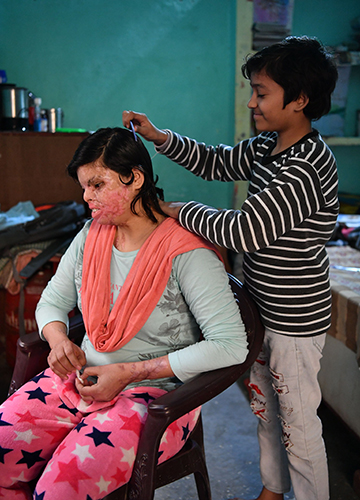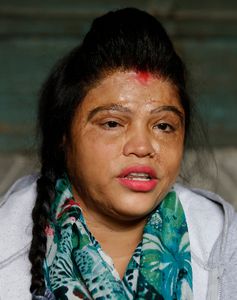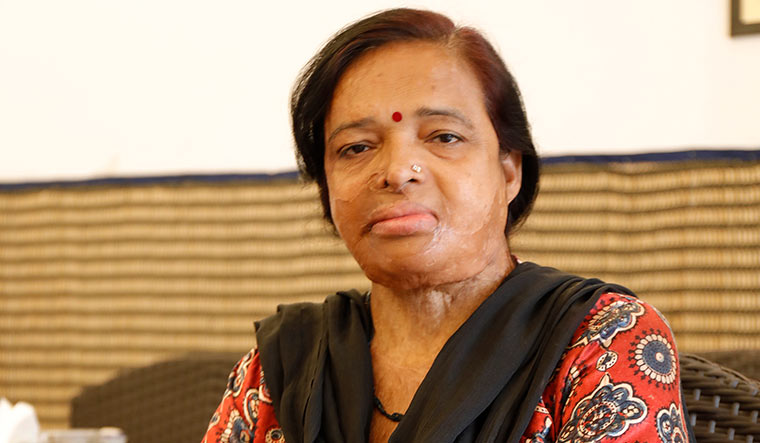Victimhood can be addictive and its seduction enduring. We encounter it multiple times when reaching out to acid attack survivors in the hope of documenting untold stories of grit. One asks for money, another for a washing machine, and a third says that a sewing machine would suffice.
There is no denying the corrosive physical and emotional trauma of an acid attack. Imagine the sting of a burning matchstick. Multiply that a hundred times over. Add to that the disfigurement of the face and limbs, possible loss of vision and hearing. In India, 244 such attacks were reported in 2017—the latest year for which data has been released by the National Crime Records Bureau.
Acid attacks are born from animosity that could stem from rejected suitors, caste disputes and property tangles—broadly any reason that could cause ill-will between individuals. It takes many calls and multiple contacts to persuade Kavita Verma, 27, living in Lucknow’s Rajajipuram locality, to share her story. Now married and expecting her first child, Verma was attacked at the age of 22 by a much older, married man who wanted her attention. “I told people my experience and it was published in a book. The others whose stories were featured got money. I got nothing,” Verma tells THE WEEK.
The months following the attack were hard. Her father questioned her character, and neighbours told her that she was so ugly that death would have been a better option. So, she attempted suicide. Her attacker was jailed for 10 months, but was granted bail when Verma told the court that she could not identify him—a statement she says she made under pressure from her father. She has since moved appeals in higher courts to record a fresh statement. In 2015, Verma got a compensation of Rs5 lakh from the Uttar Pradesh Rani Laxmi Bai Mahila Evam Bal Samman Kosh. In 2016, she found work with Sheroes, a café that employs 26 acid attack survivors in its two branches at Lucknow and Agra.
Between 2013 and 2015, the Supreme Court, in the Laxmi (on whose journey the upcoming movie Chhapaak is based) versus Union of India and others case, pronounced numerous judgements that changed the way acid attacks were viewed by the law. The lawyer who filed and pursued that public interest litigation (PIL) for nine years was Aparna Bhat. Several individuals and organisations have since then claimed credit for at least one feature of that judgement—the ban of over-the-counter acid sale. Bhat, however, despairs the lack of implementation of the law. “I was hoping that the Stop Acid Attack (SAA) campaign, which had tried to claim credit for the success of the PIL, would do advocacy and ensure implementation. That is yet to happen,” she says. Alok Dixit, cofounder of SAA, says that the movement is still figuring out a way to bring about that change.
Verma’s counsel Nishant Shukla says that apart from the tardy implementation, the law has been unable to deter false prosecution. “Our system is heavily dependent on the capability of the investigating officer,” he says. “As laws get stricter, those who can manipulate it find more ways to do so at that level, while those in genuine distress continue to suffer.” He adds that the survivors’ search for justice often gets derailed by the negative celebrity limelight they receive, a contention borne out of the many cases he has fought for acid attack survivors who have preferred to go to functions and felicitations instead of being in court for hearings.
Despite the popularity of the cause, there is also disbelief for those who do not fit in the mould of a survivor. One such woman is Vimla Passi, 39, whose ordeal started with a rape in 2008. This was followed by four acid attacks (the last in July 2017) and a gang-rape in October 2012. In March 2017, when Passi was attacked with acid the third time, she was working at Sheroes. A month later, a local newspaper ran a story questioning her claims. In March 2019, Passi filed a Right to Information query addressed to the DGP office asking how her description of the crime had been held invalid when she had photographs and medical records to prove otherwise. “I might be an uneducated woman, but I know that a mobile phone’s location can be traced. Has it been proved that it was not at the crime scene?” she asks. “I was unfairly dismissed from my job on the pretext that I was irregular. They said I wanted to claim false compensation from the government.” Passi was allocated a Rajiv Gandhi Awas in Rae Bareli. She shows papers of an earlier allotment of a similar house in Lucknow, which she could not get as it already had an occupant.
Ajay Patel, founder-director of the Red Brigade Trust, says that Passi’s caste has played some role in the mistrust she has generated. “She was a dalit woman in a state that had a dalit chief minister,” he says. “She was discredited for wanting to claim compensation under the SC/ST act. Unlike many survivors who have a straight, set narrative, hers is complex.”
Every support story does not have a fairy tale ending. In 2017, Shreya Pareek, a Bengaluru-based journalist, had undertaken a crowdfunding campaign for an acid attack survivor, who wanted to open a beauty parlour bigger than the one she was running from home. She says 43 donors had contributed Rs52,007, which she transferred to the survivor. But Pareek never heard back from her. “I felt cheated by the experience,” she says.
Anurag Verma, an additional advocate for the Uttar Pradesh government, says that successive amendments to law, particularly after the 2013 Delhi gang-rape case, have made the law very stringent. He cites the example of a juvenile, accused of assaulting, attacking with acid and subsequently causing the death of a man who was in a relationship with his sister. “We opposed the bail,” he says. “Under the Juvenile Justice Act, 2015, bail to a juvenile can be refused, if it defeats the end of justice. Unlike earlier, now the law does not condone misplaced sympathy for juveniles.”
In November 2018, two men attacked Shivani Tyagi, 31, on her way back home from work in Meerut’s Partapur area, and a third one flung acid on her face. The third man, says the mother of three, was Ajab Singh, 55, in whose school Tyagi had taught till three months before the attack. “He did not want me to leave the school.... He would come home and drink with my husband in the evenings. I was very uncomfortable around him,” says Tyagi, who was, at the time of the attack, working as a security guard in a mall. Her attackers were arrested, and the man who had supplied the acid was also in police custody but just for two months. And, Tyagi received a compensation of Rs1 lakh.
Meena Soni, 46, has not let her condition dictate her life. Her attacker was her husband, who subsequently drank acid and died in the same hospital where she had been admitted. Soni was married at 16. Her husband intermittently worked and then stopped completely when he was diagnosed with tuberculosis. Soni then found a job with an organisation working on women’s issues. “My husband suspected that I was having an affair,” she says. And, one Sunday in June 2004, he threw acid over her, disfiguring the right side of her face. Today, she manages a restaurant in Lucknow and has registered a NGO. “If a woman asks me what happened to my face, I respond in brief. But if a man asks me the same, I tell him about the patriarchy that frowns upon any display of independence by women. I tell him to change the way he views women,” says Soni.
Tyagi says that though she is confined to her room in a rented accommodation at Gautam Buddh Nagar now, she will step out boldly some day. “When I go to the terrace, neighbours say I must stay in as their children get scared,” she says. “But one day I will get the courage to not hide my face. My spirit is not dead.”
She will be viewed as a victor, not a victim.




